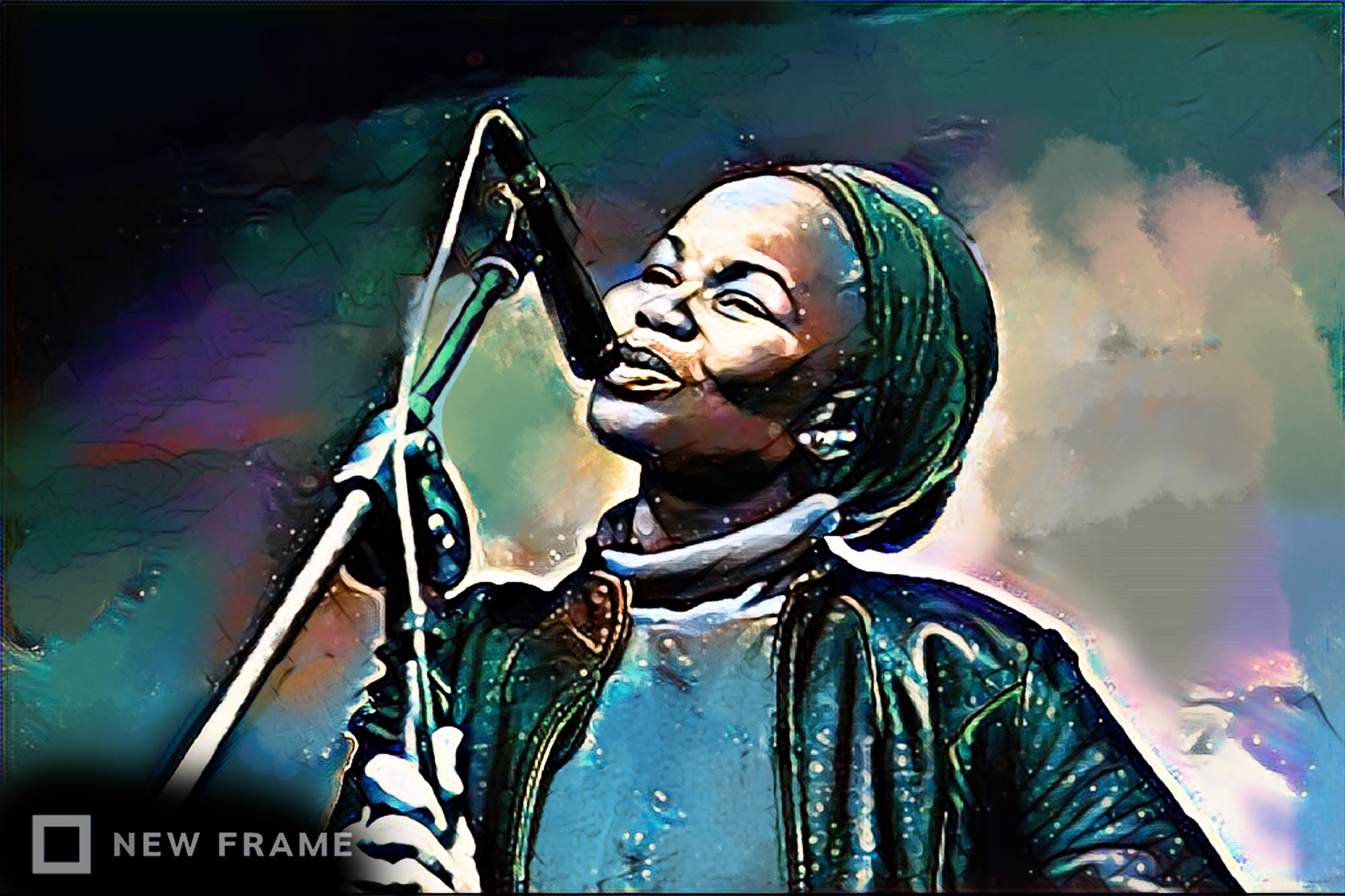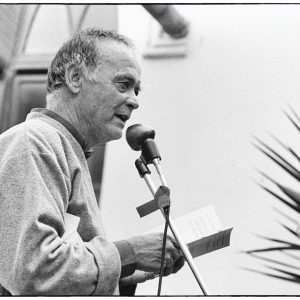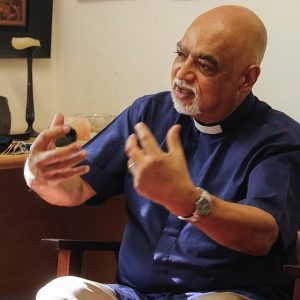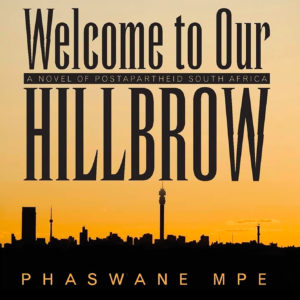Poet Primrose Mrwebi’s humanism remembered
South Africa’s creative and activist communities are mourning the death of the poet and gender rights activist by highlighting the lessons she imparted when she was still alive.
Author:
3 March 2022

Old treasures
Surfaced through
New heartaches
Breaking her sentence midway, Roché Kester says softly: “Oh shit, I’m gonna cry.” After a slight pause, she collects herself and continues: “You know, the thing about Prim was that, despite everything, she still had a manner of sharing joy. She was in so many artists’ corners. She would be there to support you.”
Kester, a queer rights activist and poet, is talking about Primrose Mrwebi, the writer, poet, performer and gender rights activist who died on 12 February at the age of 46, following a years-long battle with cancer.
“Prim was one of the veteran poets in the Cape Town poetry scene,” Kester adds. “Through her, and her encouragement, a lot of poets’ careers were started. She had this complete love for poetry, was passionate about poetry and she did a lot for the community. But also, she was an activist in her own right. She was passionate about gender issues.”
We remember and honour sister poet
Change agent
Word art seeder
Youth soul fire igniter
Sister Primrose Mrwebi
Related article:
Born in Gugulethu on 5 September 1976, Mrwebi became involved in theatre during her secondary education at Maitland High School. She later studied dance, speech and drama at the Waterfront Theatre School in Cape Town.
A contributor to many publications, including Cosmopolitan, Fair Lady, Bona and Abafazi, Mrwebi also worked with the Baxter Zabalaza Theatre Festival as a facilitator and adviser.
She established the PrimPoetry Foundation in 2018. In an interview a year later, Mrwebi said that “the core business of [the foundation] is to bring young people into poetry spaces”. She had earlier founded an organisation called the Bhalani Readers and Writers Association, which was focused on building reading clubs in Khayelitsha. She was also a regular contributor to the Book Week for Young Readers at the Franschhoek Literary Festival and a facilitator at the Northern Cape Writers Festival.
In 2017, Mrwebi also served as chairperson of the Rape Crisis Cape Town Trust’s board of trustees, and was a trustee from 2014 to 2019. In a Facebook post, the organisation praised the role Mrwebi played as a facilitator and for having supported “the development of our core values process”.
“As a resident of Khayelitsha she brought the community eye to our decisions and deliberations and, as an artist and facilitator, she moved our conversations forward in a way that made them flow. As time went by and she grew into the role of board chair, her politics and her feminism came more and more to the fore, along with her voice as she took on the role of most senior person in the organisational structure,” the post read.
Final send-off
Recently leaving her body
Yet rooted in so many hearts and minds
An ever-widening legacy
District Six Museum’s Homecoming Centre was packed on 17 February when people from all walks of life came together to honour Mrwebi at a memorial service. One of the people responsible for organising the event was Ukhona Mlandu, Mrwebi’s friend of many years.
Mlandu, the director of Greatmore Studios in Cape Town, says the museum was chosen as the venue because Mrwebi “did a lot of her work there”. Some of it involved working with a group of old people.
“At the memorial, a lot of those women spoke to me about how Prim’s style of facilitation liberated them from their own traumas and gave them a vocabulary to articulate what they had experienced in their own lives, but also to move beyond it and reimagine themselves. And we’re talking here about women 70 years old and upwards, who remembered the space that Prim created for them to be something outside of all the roles that they were expected to play,” Mlandu says.
Related article:
This, she says, was in addition to the “kids from Khayelitsha [who] were talking about how she not only introduced them to the love for books, but also to this idea of why you must present yourself in ways that make you feel like you’re beautiful, introducing them to how you choose a scent, how you choose your favourite colour of lipstick, how you put yourself together. So I think that’s a kind of activism and a feminism that is not necessarily militant, but is very much rooted in the self.”
Of creativity
Courageous activism
Integrity
And dream womanifestation
Although she spoke about it publicly as part of her fight against gender-based violence, an assault in 2019 by her ex-partner left Mrwebi “a mess emotionally”. Mlandu says, however, that Mrwebi “was always clear” that the attack was in no way her fault.
“She was clear about not carrying any of the shame. Prim understood herself to be somebody worthy of care, affection, recognition, respect and commitment. She understood herself to be inherently deserving of this. And so, as a result, anybody who tried to kind of refuse her this or diminish this, yes, she would be hurt by it because she’s human, but she would always understand it to be their deficit, not hers. I think it’s a quiet kind of activism getting women and gender minorities to understand that the injustices that get meted out to them are not as a result of their own lack. It is the inadequacy of the other to be able to fully engage with the broad spectrum of personhood.”
Herself until the end
Another of Mrwebi’s long-term friends and creative collaborators, poet Malika Ndlovu, adds that one of Mrwebi’s stand-out character traits was “her sense of dignity” – something she displayed with great difficulty in the years leading up to her death.
“Many of us were very shocked by her passing because, for the past two and a half years, we, like the whole world … just assumed that the reason we’re not seeing people is because of the pandemic and lockdown and everybody struggling with work, struggling with life. But Prim suddenly went quiet from even the closest people to her in the last two years.”
Ndlovu adds that it was only at the memorial service that Mrwebi’s immediate family publicly disclosed that she had, for the past few years, been battling cancer. On learning the truth about the reason behind Mrwebi’s silence, Ndlovu says she felt “a kind of painful relief”.
“She had a lot of time, a lot of very painful time, to think about how she would be writing her story. And as difficult as it is for all of us who love her and feel like we would have wanted to be there, we are also kind of left with this incredible gift of a living example of someone who said, ‘I own my story.’ She did it. And it’s a very difficult thing to do.”
Related article:
Belinda Mrwebi says her older sister did not like people pitying her. “And obviously, when she wanted privacy when she started really getting sick, I could understand why. She really wanted time to heal on her own. And … the only thing we could do is respect that. We had to respect her wishes and her wanting to be with us during that time and process the sickness, and how she would bounce back from it. I don’t think any of us anticipated that this would be the end.”
We see you sisi wam’
Your light lives on
– Malika Ndlovu
Thinking back to how her friendship with Mrwebi was cemented during long chats at the Artscape Theatre’s arts café “over a bottle of wine or two or three”, Mlandu says it was these “really, really rich conversations [that] saved my life, in a way”.
“At the time, I was leaving a marriage [and] life as I knew it was ending. And it was her friendship that kind of saw me through that transition. She was quite deliberate about making sure that she’s there for me … She was my person, that one. Yo, she was my person.”
Related article:
For Ndlovu, even with all that she achieved, Mrwebi’s most important work lies with how she engaged the youth. “She was always very vocal about gender equality and gender-based violence. And [with] her own public experience of that, I think she got young people to recognise that we may be using poetry as a form of creative expression, but poetry is also our activism. It’s our sense of social responsibility. It’s how we show leadership. It’s how we are brave in the face of things that hit us personally.”
In 2013, shortly after meeting Mrwebi for the first time, Kester took to her blog detailing the experience. “I bumped into Primrose about three weeks ago at the Baxter theatre after I performed at a gig … She was in the audience and could not verbalise enough just how much poetry moved her. ‘Poetry can change things; poetry can move mountains. Poetry poetry, poetry!’ is what she said.”
Mrwebi is survived by her mother, father, son and five siblings.




